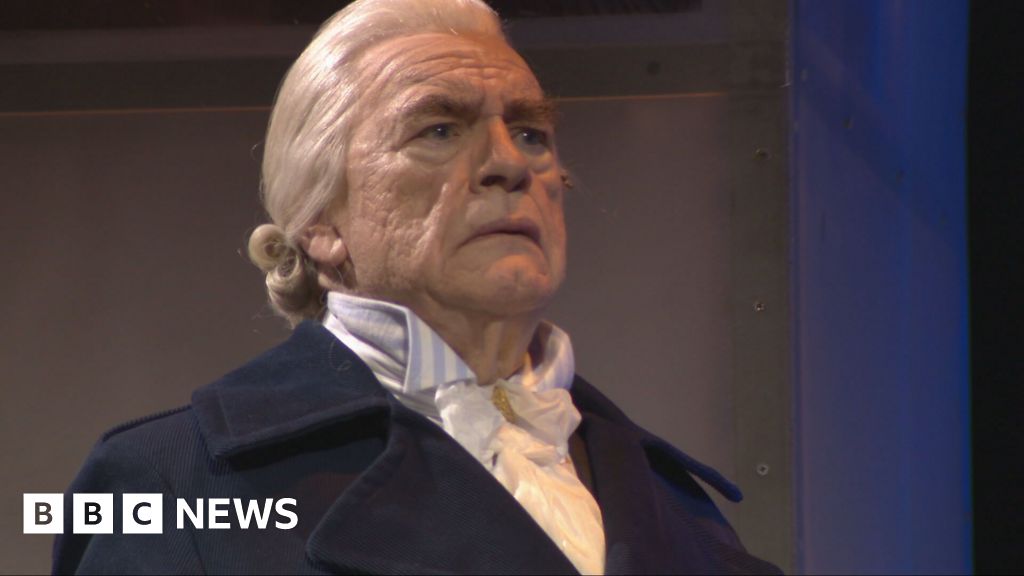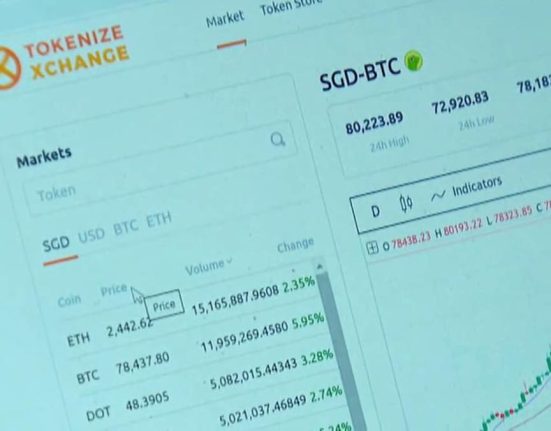Business/Economy Editor, Scotland
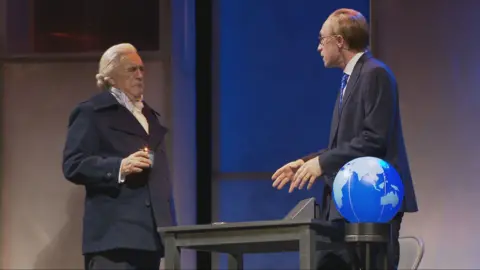 BBC
BBCDouglas Fraser became BBC Scotland’s business and economy editor on the day Royal Bank of Scotland began its downfall, threatening the world economy.
He returns to that story as a new play at the Edinburgh International Festival dramatises the bank’s downfall.
Some stories take you on a journey into the unknown.
Make it Happen is all too familiar. Most of us can recall this story from nearly 17 years ago.
That’s the time it takes someone to grow up, reaching the point of almost being able to get an overdraft.
Told in episodes that jog recollection of being an observer, the play catches the events of the banking crisis in that space between fading recent memory and hard print history.
“This is a story in time and place,” we’re told.
That time was the NICE decade – it stands for Non-Inflationary Continuing Expansion.
It meant property prices rising faster than we could earn income.
It was when the Chancellor, Gordon Brown, told us he had magicked up “the end of boom and bust”.
It was when a financial services boom made the country feel better off but masked underlying problems in the British economy.
This is also the story of how that NICE decade turned nasty.
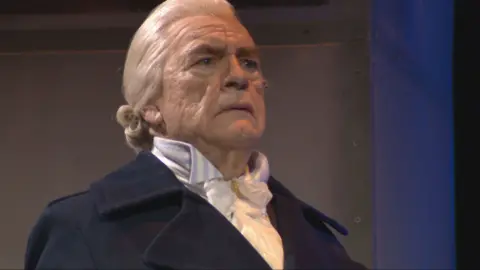
The place was Edinburgh, with a new parliament bringing a new confidence and new possibilities. Its New Town had been made possible by banking innovation in the 1700s, bringing order and prosperity.
There’s a reminder that, less than 20 years ago, banks’ foundations were riveted into the volcanic rock on which they built the city’s classical architecture.
The play recalls going to your branch to take out cash, and brings an uncomfortable reminder of how fast we’ve come to rely on our money being stored in a digital ledger in a data centre somewhere unknown.
Scottish banking “plodded along”. It was intensely dull, one character tells us, and the capital’s burghers were comfortable keeping it that way.
There are elements of satire on the capital’s middle class and two of the politicians who were vital to this story, Alistair Darling and Gordon Brown.
“Dinner at Contini’s,” brag the bankers, “then on to Fingers Piano Bar.” Where RBS became an unstoppable force – the only immovable object in the city was John Lewis department store and its devoted customers.
Its vaulting ambition arrived like a stranger riding into town – a Paisley buddy, one Fred Goodwin, who had shredded the workforce at the Clydesdale Bank HQ in Glasgow and was recruited to make banking a lot more interesting at RBS.
The bank’s advertising slogan is recruited as his instruction to staff: “Make it Happen”. Or else.
I recall discussion, in the years soon after the RBS near-collapse, of how Fred Goodwin’s story could be dramatised. We concluded that the star of the show was too dull.
Playwright James Graham does not disagree. An outsider to Scotland and Edinburgh’s banking class, he did his homework on this story.
He doesn’t give Fred Goodwin the charisma of a dramatic starring role, but instead a geeky, thoughtful intensity, building fear through his silences, with a ruthlessness that makes the audience gasp.
Played by Sandy Grierson, what gives him energy is his dialogue with the ghost of Adam Smith, played by Brian Cox.
The father of economics is rarely seen as either slightly camp or foul-mouthed, but in this reincarnation, the Dundonian screen star gets the best laughs.
Goodwin worshipped Smith’s The Wealth of Nations and is seen misinterpreting the philosopher’s teaching as a manifesto rather than an observation of the way economic entities behave.
He desperately wants to believe that personal ambition serves the common good.
But Goodwin failed to read Smith’s balancing treatise on “moral sentiment”, leaving him untethered in both his rise to greatness and his mighty fall.
Swearing, Smith’s ghost concludes that Goodwin is an “idiot”.
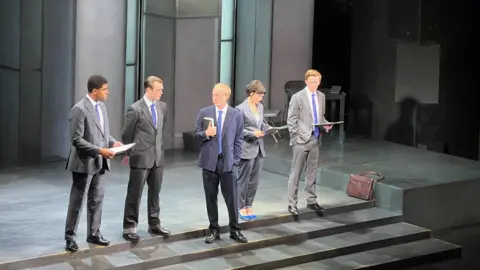
While Make it Happen is rooted in time and one place, it also takes us to a distant equivalent – ancient Greece.
Edinburgh, we’re reminded, is the Athens of the North, so named for its enlightenment and its architecture, including the mighty temple on Calton Hill that was never finished because money ran out.
The Goodwin and Royal Bank story fits neatly into the traditions of classical tragedy where hubris, or excessive pride and arrogance, leads to nemesis.
The staging of a fragmented amphitheatre has the ensemble of actors sweeping in and out, with movement and song. Sometimes they simply populate the story, or satirise the capital with nods to the staging of the 7:84 theatre productions of the 1970s.
They are also the Furies – those spirits within Greek mythology and theatre who carry retribution and deliver moral justice.
Nemesis comes in the form of a retired schoolteacher, played by Ann Louise Ross, with a handful of RBS shares, the mic at the bank’s annual general meeting, and some awkward questions.
How the RBS crisis shapes today
To tell the story, James Graham spares us the financial complexities that gave some of us sleepless nights.
The script touches only briefly on subprime mortgages being sliced and diced into toxic derivatives. There’s no mention of synthetic collateralised debt obligations.
What it also avoids is any exploration of the consequences of the financial crisis, and of how its toxicity spread from this classical tragedy to infect so many around it.
Instead, Make it Happen has a narrative arc lasting only from 1999 to 2008. So much harm done in such a short time.
The play has enough to say as it is – an important story of a crisis and an inflection point in our national story.
Our memories jogged, it leaves the audience challenged to consider how many of those consequences have shaped the economic and political world we live in now.
Make It Happen runs at the Festival Theatre in Edinburgh until 9 August.

